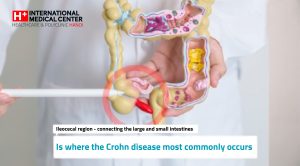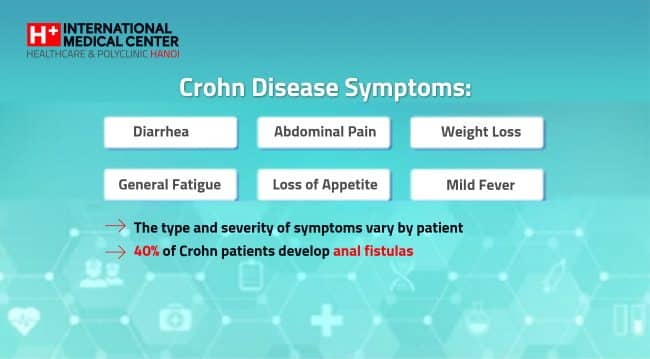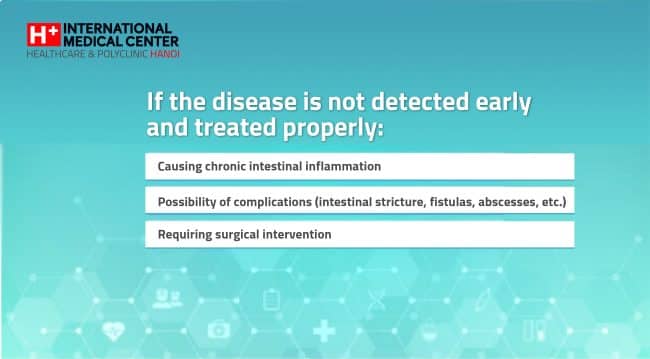Crohn’s disease is a chronic inflammatory bowel disease that causes prolonged abdominal pain, persistent diarrhea, fatigue, weight loss, and malnutrition. Inflammation can penetrate deep into the intestinal wall, resulting in pain, debilitation, and potentially life-threatening complications. Although there is currently no definitive cure, appropriate treatments can effectively manage symptoms and help extend periods of remission. Let’s explore this condition and its treatment options with H PLUS International General Clinic.
1. What Is Crohn’s Disease?
Crohn’s disease is a form of chronic inflammatory bowel disease (IBD) that causes long-term inflammation in the digestive tract. It is one of the most common types of IBD.
Inflammation can occur anywhere along the gastrointestinal tract—from the mouth to the anus—but is most commonly found in the ileocecal region, where the small intestine meets the large intestine. In some cases, the inflammation is localized to either the small or large intestine.
If not diagnosed and treated promptly, Crohn’s disease may result in:
-
Persistent intestinal inflammation affecting quality of life
-
Serious complications such as bowel strictures, fistulas, and abscesses
-
Increased risk of requiring surgical intervention
2. Causes and Symptoms of Crohn’s Disease
The exact cause of Crohn’s disease remains unclear. However, studies suggest it may be linked to a combination of environmental triggers, genetic predisposition, and immune system dysfunction. Specifically, the immune system may overreact to normal gut flora, leading to chronic gastrointestinal inflammation.
Symptoms of Crohn’s disease vary by individual and disease severity, but common signs include:
-
Chronic diarrhea, abdominal pain, and unexplained weight loss
-
Fatigue, loss of appetite, and mild fever
-
Approximately 40% of patients develop perianal fistulas, which can be painful and disruptive
3. How Is Crohn’s Disease Diagnosed?
There is no single test that definitively diagnoses Crohn’s disease. Diagnosis typically requires a combination of clinical evaluation, medical history, and various diagnostic tests.
Common diagnostic methods include:
-
Blood tests: To detect inflammation and anemia
-
Stool tests: To check for infection or markers of intestinal inflammation
-
Endoscopy and colonoscopy: To directly visualize the intestinal mucosa and obtain biopsies
-
Imaging (CT, MRI, ultrasound): To assess damage, especially in the small intestine where endoscopy may not reach
A diagnosis is made based on a comprehensive review of clinical findings, imaging, and laboratory results.
4. Treatment Options for Crohn’s Disease
The goals of Crohn’s disease treatment are:
-
To control symptoms and extend remission periods, improving overall quality of life
-
To prevent complications and reduce progression of gastrointestinal inflammation
Treatment is tailored to each patient depending on disease location, severity, and overall health. Common medications include:
-
Anti-inflammatory drugs: To reduce intestinal inflammation
-
Corticosteroids: To manage flare-ups
-
Immunomodulators: To regulate abnormal immune responses
-
Antibiotics: To manage infections and prevent complications
-
Biologic therapies: To target specific proteins that drive inflammation
In severe cases or when complications such as bowel perforation, obstruction, hemorrhage, or fistula occur, surgery may be required to remove the affected intestinal segments.
Crohn’s disease—also known as regional enteritis—is characterized by chronic, transmural inflammation that often affects the small intestine and colon. Without timely diagnosis and intervention, it may result in serious complications such as abscesses, strictures, fistulas, or an increased risk of colorectal cancer. Depending on disease progression, management may involve medical therapy or surgical procedures. Adhering to the treatment plan, along with a well-balanced, gut-friendly diet, is essential for long-term disease control.
5. Specialized Digestive Endoscopy at H PLUS
H PLUS International General Clinic provides advanced gastrointestinal endoscopy services to detect intestinal diseases early and offer the most appropriate treatment strategies. Backed by a highly skilled medical team and state-of-the-art equipment, H PLUS is a trusted destination for comprehensive digestive healthcare.
To schedule a consultation or procedure, please contact our hotline at +84 24-7306-9889.
Phòng khám Đa khoa Quốc tế H PLUS – H PLUS International Medical Center (H PLUS Hanoi)
“Y học tiên phong – Song hành cùng y đức”
- Địa chỉ: Tầng 7–8, Lotte Mall Tây Hồ, 272 Võ Chí Công, Hà Nội
- Website: clinichplus.com
- Hotline: 024 7306 9889
- Đặt lịch nhanh: https://forms.gle/8t84zLGVjw4gJQei9
- Zalo OA: https://zalo.me/hplushn
- Kakao Talk: https://pf.kakao.com/_AcWun
#Hplus #HPIMC #phongkhamdakhoa #clinic #LotteMallWestLakeHanoi
 +84 24-7306-9889
+84 24-7306-9889  Booking
Booking 





